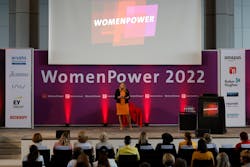Complementary engineering and chemistry skill sets found in Young Engineering Award finalist
Dr. rer. nat. Soraya Laghmari El Moussati is a lead engineer for environmental technology at Bayer in Leverkusen, Germany. She is one of three finalists for the Young Engineering Award, which will be announced on April 21 during the WomenPower Career Congress at Hannover Messe (Figure 1). The initiative is intended to boost motivation for women to take up a career in science, technology, engineering and mathematics (STEM).
Lisa Ihde, a web designer, software engineer, design-thinking coach and author from the Hasso Plattner Institute in Potsdam, Germany, and Carolin Neumann, an associate application consultant at IBM, are the award’s other two finalists.
After studying chemistry at the University of Duisburg-Essen, Laghmari obtained her doctorate there before embarking on her career path. Laghmari is passionate about chemistry; she is involved in the Bayer Business Resource Group Merge and also volunteers as a mentor with Rock Your Life!
Did you have any coach/mentor in the chemistry industry or throughout your studies who helped you to navigate the male-dominated domain and encouraged you to continue with a STEM career?
Soraya Laghmari: On the topic of finding inspiration and support, I have been fortunate enough to have a number of people positively influence and guide me along the way. Although I never had a formal coach, my mother has been a true Powerwoman and a source of constant inspiration for me. From a young age, she encouraged me to pursue my dreams and work hard to achieve them. Throughout my studies, my PhD, and beyond, she has been my rock, providing unwavering support and guidance. My entire family has been a strong source of encouragement and valuable advice.
Additionally, I am incredibly grateful to have a partner who supports and uplifts me in all aspects of my life. While balancing work and personal life can be challenging, my fiancé is always there to give me the boost I need to keep going. In fact, we are getting married just two weeks after the Hannover Messe.
Unfortunately, not everyone has a supportive environment like mine. There are countless women out there with immense potential whose talents may be dismissed simply because of their gender. It is our duty to encourage women to pursue their passions and provide them with the tools and resources they need to succeed.
What are you doing to make yourself a role model or mentor to other girls/women who are interested in pursuing a STEM career?
Soraya Laghmari: As a first-generation academic and at the same time being the first in my family completing a PhD and also being the child of migrant workers, I understand the importance of education and the challenges that young women may face in the STEM industries. Therefore, I have always been interested in social activism and believe that education is the key to success.
Luckily, I was fortunate enough to have a family that valued education and was also supported by educational institutions. However, this is unfortunately not the reality for everyone, which is why we as a society must try to make education accessible to all and provide equal opportunities and possibilities. Future generations, and especially women, who have difficult starting conditions, must be supported so that they can realize their full potential.
That is why I joined the GROW initiative (Growing Representation & Opportunities for Women), launched by Bayer, which advocates for the growth and success of women at Bayer and aims to achieve full gender parity in management by 2030 at the latest. Another initiative I am currently involved in is Merge, a recognized, sustainable part of Bayer that gives young employees a voice, offers a networking opportunities and creates an open and inclusive work culture. These are important topics for me and are worth getting involved in.
During my studies, I also volunteered for the educational initiative Rock Your Life!, where I have built mentoring relationships with female students to help them discover their potential and show them that a career in science is attainable. It was a great experience for me to see how I could help shape the future of these young girls positively with my knowledge and experience.
However, I also think that it is important not only to act as a role model publicly but also to make a difference in one's personal environment. I have often witnessed in my environment and social circle that support was lacking. Therefore, I have made it my mission to educate and encourage female friends and relatives to pursue their interests and passions and not to be deterred by societal prejudices. I think that every individual can make a contribution in their personal environment to encourage and promote young women.
With the skilled labor shortage that began pre-pandemic, was heightened by the shutdown and continues to linger, how can organizations capitalize on the availability of women to fill these skilled positions?
Soraya Laghmari: Companies can take various measures to leverage the availability of women for filling qualified positions. During the application process, this can be achieved, for example, by initiating special recruiting campaigns and targeting job advertisements toward women.
It is also important to specifically address women as potential applicants and appreciate their talents and abilities. At the workplace, flexible work arrangements such as part-time, remote work or flexible schedules can significantly contribute to better integration of women into the labor market.
Bayer is an outstanding example of how companies can change their work cultures and practices to promote gender equality in the workplace. With a focus on part-time and hybrid working models, which enable a balanced work-life, Bayer is a pioneer in Germany.
At Bayer Engineering & Technology (E&T) Germany, all positions are advertised as both part-time or full-time. The experiences and challenges of the pandemic have shown that virtual working and flexible work models are essential for an effective and successful work environment.
Bayer has used these insights and has proven that it is possible to offer women and men alike the opportunity to reconcile their careers and family responsibilities. It is important that more companies follow this example to promote equality and justice for women in the workplace. When companies demonstrate flexibility and family-friendliness, this can help immensely to attract women to qualified positions.
However, even during school and university, women must be encouraged through training and continuing education programs, as well as mentoring programs. This is because studies indicated that girls and young women can indeed be interested in STEM subjects in school, but that this interest often does not result in a STEM degree. This is partly due to inadequate information about career opportunities in STEM fields.
To counteract this, companies and educational institutions should take targeted measures, including the promotion of role models, targeted outreach to women in study and career orientation and awareness-raising for unconscious biases and stereotypes. Creating an inclusive work and learning culture can also help women choose a STEM degree and career in this field.
In her relatively famous study, published in the Harvard Business Review, MIT’s Susan Silbey and her colleagues found that women in engineering were hoping to make a more socially conscious impact in their engineering pursuits than the males in the study. What, if anything, does this tell us about gender bias? And, if the report is indicative of a real female desire to make a difference, where might women find those types of jobs to have a positive impact on society and civilization with their engineering, science and automation expertise?
Soraya Laghmari: The study is particularly intriguing to me because, like many others, I always had and continue to have a strong desire to integrate a social component into my career. But this is by no means a bad thing because, in the STEM field, there are many opportunities to fulfill this drive. However, this study suggests that gender-specific biases exist that prompt women to view their work differently than men.
This completes the cycle, as breaking down stereotypical gender roles and biases and promoting gender equality in the STEM field requires women as role models and positive examples to inspire and motivate.
There are numerous opportunities for women, such as myself, who are still interested in pursuing a career in STEM and making a positive impact on society.
Environmental technology, in which I am also involved, is an excellent example of how women can use their STEM knowledge to develop and implement solutions for environmental issues. Another example is biotechnology, where women can contribute to fighting diseases and developing new treatments or renewable energy technology and numerous other fields.
What was your motivation for venturing into STEM studies in the first place?
Soraya Laghmari: There are several reasons why I chose to study chemistry. First, I am fascinated by chemistry as a science, and the way it influences our daily lives is incredibly exciting. I have always been intrigued by understanding how the world around us functions and how this knowledge can be utilized to develop new materials, medications or technologies. For example, as a young girl, I always wondered how hand warmers, which miraculously warm up when you bend them, work or why some metals rust and some do not.
Second, there are many applications in chemistry that can contribute to making the world a better place, whether it is by developing new medications to combat diseases or researching environmentally friendly technologies to combat climate change. Last, I was attracted to the prospect of a career in an area that is constantly evolving and producing new developments and innovations.
How do chemists and engineers complement one another's skills? What does each bring to the partnership, and how do they create something greater than the sum of their parts?
Soraya Laghmari: As a PhD chemist and expert lead engineer at Bayer, I am a prime example of how chemists and engineers can complement each other's work and benefit from each other's expertise. In a recent project, my team and I overcame complex challenges and achieved innovative solutions by combining our unique perspectives and areas of expertise.
By leveraging my deep understanding of chemistry and chemical processes alongside my colleagues' knowledge of chemical process engineering, we were able to gain a comprehensive understanding of the overall process and its implications.
I led efforts to execute detailed mass balances and designed experiments to characterize the process streams, which allowed us to recommend improvements to water quality across multiple manufacturing sites. This collaborative approach not only yielded higher quality work, but also fostered an open and inclusive working environment where every team member was heard and valued.






